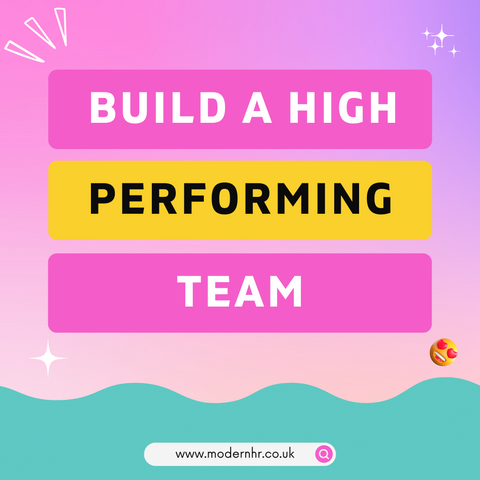How to build a high performing team

If so, you're in the right place. But this isn't always easy to achieve. It’s no wonder so many of my clients feel daunted by it. Where on earth do you start? 😱
In this blog, I’m going to focus on the super-critical things you need to do to boost team performance. So, put the kettle on, and have your pen and notepad at the ready. ☕🗒
What's a high performing team?
Building a high performing team is your most important job as a leader – because it directly impacts on the success of your business 📈
For me, a high performing team is the perfect number of talented individuals – each having the necessary experience, skills, values, and personalities – that work harmoniously together to help grow your business. It's a team that achieves the goals you set for them. It's a team that's healthy and happy.
But, your measures of team performance and success may be slightly different.
The beauty of this it can be totally built on your terms – reflecting what’s important to you and your business. 👌
START WITH THE BIG QUESTIONS ❓❓❓
- What does a high performing team mean to you?
- What do you want customers, clients, and suppliers to say about what it’s like doing business with you?
- What do you want your staff to say about how it feels to be one of your employees?
- What do you want your business legacy to be?
These are all BIG, meaty questions that should be defined by your brand values.
For example, your brand values might centre around delivering the highest-quality product.
Therefore, those values should permeate through everything you do, and every decision you make. From where you buy your materials from, to the turnaround times you quote your customers.
A team that’s been recruited to deliver the highest quality products will look super-different to a team that’s been recruited to deliver a different brand value. A team focussed on quality, will value things like being detail oriented; process driven; standards centric; and totally consistent.
Six Traits of High-Performing Teams
While every team is different, here's some common characteristics that high-performing teams share which is influenced greatly by the company culture.
1. Shared Vision & Goals
High performing teams have shared team and individual goals that support the organisation's vision so that their work drives achievement. They are working together to solve problems and committed to contributing to team effectiveness.
2. Purpose & Connection
When employees understand how their job fits into the context of the overall goals and mission of the organisation, they are more engaged. Everyone therefore understands how they contribute and add value. High-performing teams know their “why” and work together to support a shared vision.
3. Accountability
High-performing teams have defined roles and responsibilities and hold each other to account and have a good understanding of what each person in the team does and is accountable for. This prevents confusion and drives high standards of each other, for fear of letting the team down. The team leader is skilled in managing conflict.
4. Trust Respect
Employees on high-performing teams value each other and trust each person to do their job to a high level. They respect diversity of thought and experience and recognise those differences make the team culture stronger and leads to a positive working environment.
5. Focus on the right things
High-performing teams focus on what matters most and spend their time accordingly to achieve outstanding results. They understand that not all work has equal importance or urgency and they manage projects based on what tasks have the highest priority and highest impact.
6. Celebrate success together
High-performing teams celebrate wins together and take opportunities to show appreciation towards each other, which helps everyone feel valued and connected towards the common goals.
Team Performance Metrics
If you want to start building a high performing culture, the most important thing is to define your team performance metrics and start tracking them. Here's some examples to help you get started which you can then use to improve team performance.
Attendance Rate
First and foremost, it’s important to look at whether a team member shows up to work or not. If a team member is consistently showing up late, leaving early, or taking an unusual number of sick days, they may be burnt out or disengaged, which will negatively impact productivity.
Employee Engagement
Engaged employees go above and beyond the call of duty. Employee Engagement surveys are a great way to assess employee engagement levels and also disengagement within your team. Employees who ask for help or jump in when they see help is needed are the ones that show initiative—and an employee who shows initiative is a sign of team satisfaction and engagement.
Employee Enablement
Team members need the tools and resources to be able to complete their work on time. Employee Enablement surveys identify tools, systems or resources needed to drive effectiveness and efficiency. Look for missed deadlines or work that suffers as a result of tight deadlines for clues as to how efficiently a team member is working.
Goal Achievement
High performing teams are productive and are able to achieve the most challenging goals. So, if you set business goals at the start of each year or quarter, you can look at the extent to which the goals have been achieved. If you have business Key Performance Indicators, then you can track these each quarter to measure team performance as new people join and team members team.






